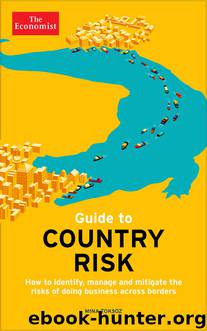Guide to Country Risk by The Economist

Author:The Economist [Toksöz, Mina]
Language: eng
Format: epub
ISBN: 9781610394871
Publisher: PublicAffairs
Corruption
As country risk analysis has widened its scope to include institutional structures, governance and business environment risks have come into focus. From the point of view of country risk management, corruption is a problem if it undermines a country’s ability to pay by eroding public funds. Given the international regulatory framework now in place to prevent corruption, it is also a reputational risk for cross-border investors.
Corruption is a reflection of weak institutions. It is often defined as the abuse of public power for private benefit, implying the involvement of a public sector or political entity. However, it clearly is also endemic among private entities globally, judging by the long list of high-profile corporate governance failures in developed countries and recent attempts to fiddle the LIBOR markets.1 Public-sector corruption tends to be limited by media scrutiny and the greater transparency demanded of public institutions in the developed world. Corruption in state services and political patronage are more associated with developing countries where social change is rapid, institutional development is sluggish and media freedom is restricted. The weaker the rule of law and market and political institutions, the higher are the risks of corruption, nepotism and crony capitalism.
Cross-border transactions are more prone to corruption in sectors that are dominated by monopolistic or oligopolistic structures and where state licensing is required, such as mining, defence, large infrastructure or construction projects, and utilities sectors. This was the main source of the Licence Raj (the system of licences, regulations and accompanying red tape that were required to set up and run businesses) in India before its liberalisation in the 1990s. Countries or regions where corruption is high tend to export it to the periphery. Smuggling networks also foster corruption along their routes. International sanctions imposed on Iraq spawned global corruption, which infiltrated several US- and EU-based organisations. Similarly, sanctions on Iran have generated smuggling networks that have allegedly drawn in Halkbank, one of Turkey’s biggest state banks.
The release of funding by multilateral agencies now increasingly requires measures to ensure good governance of the funds. Policies that reinforce nepotism and cronyism and generate hidden subsidies are being monitored – even if entrenched political interests prevent them being significantly altered. However, a problem with this approach is that what is considered to be corruption in one culture may be a traditional way of doing business in another. In the absence of strong institutions, sometimes it is the patronage networks that provide a measure of certainty and security for local business. Hence the boundary between what is legal and what is not can be difficult to draw using developed-economy governance standards.
Download
This site does not store any files on its server. We only index and link to content provided by other sites. Please contact the content providers to delete copyright contents if any and email us, we'll remove relevant links or contents immediately.
The Meaning of the Library by unknow(2572)
Six Billion Shoppers by Porter Erisman(2304)
Why Nations Fail: The Origins of Power, Prosperity, and Poverty by Daron Acemoglu & James Robinson(2299)
No Time to Say Goodbye(2118)
Red Notice by Bill Browder(2082)
Currency Trading For Dummies by Brian Dolan(1929)
The Economist [T6, 22 Thg9 2017] by The Economist(1927)
Thank You for Being Late by Thomas L. Friedman(1772)
Bitcoin: The Ultimate Guide to the World of Bitcoin, Bitcoin Mining, Bitcoin Investing, Blockchain Technology, Cryptocurrency (2nd Edition) by Ikuya Takashima(1699)
Amazon FBA: Amazon FBA Blackbook: Everything You Need To Know to Start Your Amazon Business Empire (Amazon Empire, FBA Mastery) by John Fisher(1575)
Coffee: From Bean to Barista by Robert W. Thurston(1547)
The Future Is Asian by Parag Khanna(1484)
The Great Economists by Linda Yueh(1455)
How Money Got Free: Bitcoin and the Fight for the Future of Finance by Brian Patrick Eha(1425)
Grave New World by Stephen D. King(1421)
Pocket World in Figures 2018 by The Economist(1420)
Capitalism Without Capital: The Rise of the Intangible Economy by Jonathan Haskel(1402)
The Sex Business by Economist(1386)
Cultural Intelligence by David C. Thomas(1289)
